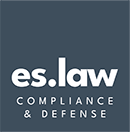Elements of the offence
The offence of embezzlement is a key crime under commercial criminal law. Anyone who knowingly abuses his or her authority to dispose of property of another or to engage another thus causing a financial detriment to the other person, commits the offence of embezzlement and is liable to prosecution (Sec 153 para 1 StGB).
Abuse of authority
Embezzlement can only be committed by a person in a position of power who has a specific authority. Authority represents the internal relationship between the holder of power (employee or manager) and the provider of power (often the company). It regulates the scope of the internal guidelines and thus the internal “permission” of the person with power. The external relationship, on the other hand, regulates the legal “ability” to bind another person externally or to dispose of another person’s assets.
In order to be liable to be prosecuted for embezzlement, the perpetrator must have abused his or her authority. Abuse of authority occurs when if the perpetrator disregards the authority granted to him in the internal relationship (permission) in the external relationship (ability). The perpetrator “can therefore do more than he is allowed to“.
In order to act abusively, the perpetrator must violate rules that serve to protect the economic interests of the owner in an indefensible manner (Sec 153 para 2 StGB). This is the case if the use is beyond the reasonable. This can already be the case with any deviation from clear internal regulations.
If there are no clear internal guidelines, Sec 1009 and Sec 1013 of the Austrian Civil Code (ABGB) apply, according to which a holder of power is obliged to provide the greatest possible benefit to the party granting the authority. In this context, the business judgment rule originating from corporate law must also be considered.
In most cases, it is not easy to determine whether a misuse of authority has already occurred or not (yet). However, since this question is of great importance for companies, an expert, e.g. a lawyer specializing in commercial criminal law, should be consulted if necessary.
The offence of embezzlement requires that the perpetrator knowingly abuses his authority. He must therefore be certain that he is exceeding his authority in order to perform acts of representation in the external relationship, although he is not authorized to do so.
Financial loss
To justify criminal liability, the misuse of authority must result in financial loss. This may consist of a decrease in assets, an increase in liabilities or a loss of profits.
With regard to financial loss, a so-called contingent intent on the part of the perpetrator is sufficient. The perpetrator must (only) seriously consider and accept the possibility of causing financial loss to the party granting the power (e.g. the company) by knowingly misusing the authority.
Examples of embezzlement in everyday business life
The first step in determining whether the criminal offence of embezzlement has been committed is to apply the rules of the internal regulations of the particular company. Even the granting of price discounts outside the scope of the authority granted can constitute a criminal offence of embezzlement if there is sufficient intent. If an employee gives a customer 20% discount when the maximum discount allowed is 10%, the employee may be guilty of embezzlement, if he or she acted with intent. However, in another company, where a discount of 20% is also allowed, there would be no offence of embezzlement. This clearly shows that the primary indicator of embezzlement is the internal rules of each company.
Knowingly abusing authority by purchasing goods or services at a (deliberately) inflated price can also fall under the criminal offence of embezzlement.
In addition, the granting of a loan despite the debtor’s lack of creditworthiness and without the provision of customary collateral can also constitute the offence of embezzlement. In practice, the cases can be very diverse. Acts may include legal transactions such as entering into obligations or granting authorizations. They may also include de facto acts of a legal nature, such as giving instructions.
Embezzlement: tips for compliance and criminal defense
The following practical tips for companies should also be considered when dealing with issues relating to the possible prevention of criminal liability for offence of embezzlement and criminal defense:
- Company agreements, compliance requirements and any group guidelines can also be used to determine whether there is a suspicion of embezzlement.
- In order to avoid retrospective errors, the information and factual situation at the time of the decision (exercise of authority) must be examined. If a transaction turns out to be disadvantageous in retrospect, this does not necessarily mean that the accusation of embezzlement can be derived from this.
- The prior consent of the beneficial owner (shareholder) rules out any abuse of authority. If the grantor of power is a corporation (GmbH, AG, FlexKapG, SE), consent can be given by the shareholders. In order to exclude criminal liability, this must take place before the act is committed.
Impending penalties and disqualification as managing director upon conviction
According to Sec 153 para 1 StGB, embezzlement is punishable by a prison sentence of up to six months or a fine of up to 360 daily rates. If the damage caused by the offence is exceeding EUR 5,000, the penalty is imprisonment for up to three years. If the loss incurred exceeds EUR 300,000, the penalty ranges from one to ten years’ imprisonment.
In addition to these risks of criminal liability, decision-makers in management positions also need to be particularly careful from another perspective: In the event of a final conviction of more than six months’ imprisonment for a white-collar crime such as embezzlement, a managing director or a member of the management board may no longer hold this position (Sec 15 para 1a Austrian Act on Limited Liability Companies, Sec 75 para 2a Austrian Stock Corporation Act). This is referred to as the legal consequence of “disqualification”. Managing directors and management board members are therefore advised to pay close attention to the limits of their own powers. If managing directors and board members are accused of criminal charges in a criminal investigation, the stakes are high for these individuals, meaning that rapid legal assistance is often indispensable.
Criminal defense by a lawyer in the event of allegations of offence of embezzlement
If your company is suspected of committing a crime of embezzlement despite having implemented compliance measures, it is advisable to consult a lawyer specializing in white-collar criminal law. A lawyer will examine your individual circumstances, review the case files and develop a suitable defense strategy for you as the accused on this basis.
An experienced lawyer will also inform you of your rights in criminal proceedings, accompany you to your interrogation by the police and work with you to develop a strategy to best protect your interests.
Companies as victims: possibility of private participation
The crime of embezzlement damages the company because the perpetrator’s misuse of authority causes financial loss to the company. As part of their duty of care, decision-makers such as managing directors, board members and supervisory board members are required to work to repair the damage and to take the necessary steps. This can be done in particular by conducting an internal investigation, subsequently submitting a statement of facts to the public prosecutor’s office and joining the criminal proceedings as a private party.
In addition, civil law claims – in particular claims for damages – can also be asserted in a separate civil action. This depends on the right timing, strategic considerations and clarification of the right preliminary legal issues. If you do not have the relevant expertise, it is advisable to consult a lawyer at an early stage.


